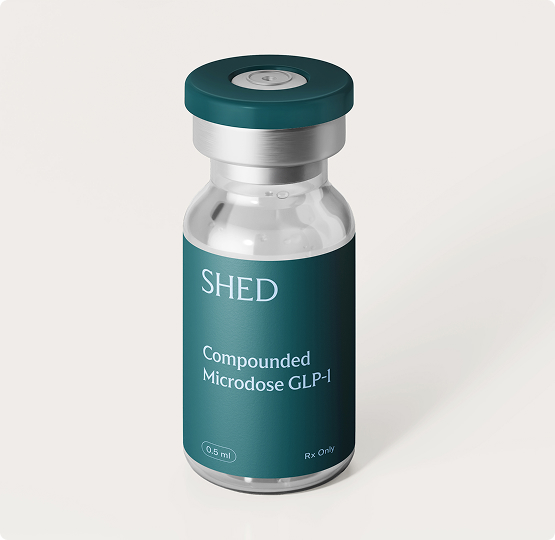Acne has many triggers and can appear just about anywhere on the face. One of the most common causes of acne is hormones.
What is hormonal acne?
Hormonal acne is a type of acne that is caused by fluctuations in hormone levels. It has a distinct clinical signature, and recognizing it requires a combined understanding of dermatology and endocrinology.
- Location: Typically localized to the jawline, chin, and lower face.
- Type of lesions: Commonly presents as painful cystic nodules.
- Pattern: Lesions tend to worsen in the premenstrual phase (the late luteal phase of the menstrual cycle) due to the hormonal shifts that occur during the luteal phase.
- Other symptoms: Acne caused by hormonal imbalances may cause other symptoms as well, such as excessive hair growth, irregular periods, or weight gain.
Hormonal acne is slow to resolve, often deep under the skin, and typically unresponsive to over-the-counter topical products.
Hormones that trigger acne
There isn’t just one “acne” hormone. Lots of hormones can have a direct or indirect effect on acne. Here are just a few:
- Androgens such as testosterone and DHEAS stimulate the sebaceous glands, leading to increased sebum production and follicular hyperkeratinization, a skin condition caused by an excessive buildup of keratin. This creates an ideal environment for the growth of Cutibacterium acnes, which contributes to local inflammation and pustule formation.
- The stress hormone cortisol can worsen breakouts indirectly by modulating the endocrine axis and altering immune signaling.
- A major contributor in many women is undiagnosed polycystic ovary syndrome (PCOS). PCOS is fundamentally a disorder of androgen excess, but many women do not meet the classic criteria and are dismissed.
When I see hormonal acne, especially if it is paired with irregular cycles or unwanted facial hair, PCOS jumps to the top of my differential. However, hormonal acne can happen even if you don’t have a specific hormone condition.
Lifestyle factors that can affect hormonal acne
While some hormonal imbalances will require medical treatment, lifestyle can play a role in hormonal acne as well.
- Stress: Cortisol increases oil production in the skin, leading to clogged pores. It also promotes inflammation, which can worsen skin lesions.
- Not enough sleep: Poor sleep can disrupt hormonal balance, leading to an increased production of androgens, which stimulates oil production.
- Using the wrong hair or skin products: Topical products that aren’t oil-free can trigger acne. You’ll also want to make sure your products are non-comedogenic or non-acnegenic, meaning they don’t contain ingredients that clog pores.
Lifestyle changes are almost always the first line of defense when treating any condition, whether it’s hormone related or not. However, if you’re still having trouble with persistent acne, medical treatment may be necessary.
How hormonal acne is treated
Treatment must reflect the underlying cause, not just what you see on your skin. Treatment can include medication, topical treatments, or a combination of the two.
For women, spironolactone is a cornerstone therapy that works by blocking androgen receptors at the level of the skin. Combined oral contraceptives, particularly those that include a low androgen index progestin such as drospirenone, can also be effective. For men, we would favor standard acne therapy or isotretinoin rather than antiandrogens.
These systemic therapies are often more successful than topical treatments alone, especially in cases where the acne is hormonally mediated. Consult your doctor or dermatologist before making major changes to your skincare regimen or starting any kind of hormone treatment.
Final thoughts
Hormonal acne can be stubborn, painful, and frustrating, but understanding the root cause is the first step toward effective treatment. With the right combination of lifestyle adjustments, medical support, and skincare treatments, hormonal acne can be managed, and in many cases, significantly improved.
If you suspect your acne is hormone related, don’t hesitate to reach out to a dermatologist or healthcare provider. They will recommend a treatment plan that is tailored to your needs.
FAQs about hormonal acne
Can men get hormonal acne?
Yes. While hormonal acne is often discussed in relation to women’s menstrual cycles, men can also experience breakouts triggered by androgens like testosterone. Stress, diet, and other lifestyle factors can contribute to hormonal acne, for both men and women.
How do I know if my acne is hormonal?
Hormonal acne typically appears around the jawline, chin, and lower face. For women, it often shows up as deep, painful cystic bumps that worsen before her period starts. If acne is unresponsive to over-the-counter products, this is another sign that hormones could be the culprit.
Does hormonal acne go away on its own?
Most of the time, it doesn’t. Hormonal acne is persistent and often requires targeted treatment that addresses underlying hormone fluctuations. While breakouts may improve with age or lifestyle changes, medical treatment is often needed for lasting results.
What is the best treatment for hormonal acne?
The most effective treatments usually include systemic therapies like spironolactone, oral contraceptives, or a combination of medical and topical solutions. The right treatment for you will depend on your specific hormone profile and overall health.
*This information is for educational purposes only and is not a substitute for medical advice. Please consult your healthcare provider before starting or changing any medication.
.svg)









